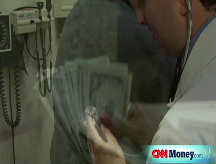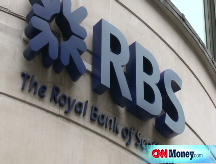Stocks stumble after rally
Wall Street retreats on ongoing worries about the economy and the banking system.

NEW YORK (CNNMoney.com) -- Stocks tumbled Thursday, erasing early gains, as investors picked through the health care and banking initiatives in President Obama's federal budget amid continued worries about the economy.
After the close, Dell (DELL, Fortune 500) reported quarterly sales and earnings that missed analysts' forecasts, sending shares 3% lower in extended-hours trading.
The Dow Jones industrial average (INDU) lost 89 points, or 1.2%. The S&P 500 (SPX) index lost 12 points or 1.6%. The Nasdaq composite (COMP) lost 34 points, or 2.4%.
A bank sector rally propelled the market through the late morning. But the advance lost steam as the session wore on and stocks closed in the red.
Banking stocks held on to gains on hopes for the government's various rescue plans. But technology, transportation, retail and health care stocks all declined. Health care shares fell in response to the overhaul of the sector described in the President's fiscal budget.
Stocks have been seesawing since the Dow and S&P 500 ended Monday's session at nearly 12-year lows. That low followed several down weeks as investors have sifted through the economic stimulus plan, the foreclosure fix and the bank bailout plan. While a short-term bear market rally could kick in, any longer term recovery remains elusive, analysts said.
"The markets have been disappointed by what the government has been coming up with in terms of solutions for the housing collapse and bank crisis," said Robert M. Siewert, portfolio manager at Glenmede. "Until investors have some confidence in the end game, the downturn will continue."
Bank stocks have crawled back over the last few sessions and through most of Thursday on hopes that the various plans to help the financial sector will work. But those hopes could be dashed if more details don't emerge soon, said Greg Church, president of Church Capital.
"I think we still don't know enough about how these various plans are going to work and when they will start to work," said Church. "Until we do, it's going to be hard for the market to really get going."
Friday preview: Reports on gross domestic product growth and manufacturing are due Friday morning.
Fourth-quarter gross domestic product growth (GDP) is expected to have been revised lower. GDP likely fell at an annual rate of 5.4% versus the initially reported decline of 3.8%.
The Chicago PMI, a regional read on manufacturing, is due after the market open. The index is expected to have dropped to 33 in February from 33.3 in January. Any figure below 50 signals weakness in the sector.
Budget breakdown: In Washington, President Obama outlined his plans for the federal budget for the next ten years, with a more detailed account due in April. The plan includes making permanent some tax breaks from the stimulus plan, ending certain tax breaks for the wealthy and moving closer to a universal health care system. (For details, click here).
The budget includes an additional $250 billion to stabilize the financial system, which Obama's economic team says would be the net cost of buying up to three times as much in bad assets. That would be on top of the $700 billion bank bailout plan already in existence.
The plan calls for $3.6 trillion in spending in fiscal 2010, which begins in October.
The government is forecasting a $1.75 trillion deficit for the 2009 fiscal year and a $1.17 trillion deficit for the 2010 fiscal year. Obama has said he plans to cut the deficit inherited from former President George W. Bush in half by 2013.
Financials: JPMorgan Chase (JPM, Fortune 500) said it expects steeper home-equity loan losses this year and that it will cut up to 14,000 jobs, more than it said previously. Shares gained 6%, closing off their highs.
Citigroup (C, Fortune 500) is close to finalizing a deal for the government to increase its stake in the troubled bank to as much as 40%, according to reports. A deal was expected to be announced shortly. Citi shares tumbled 2.4%, erasing early gains.
Worries that the U.S. government will have to fully take over hard-hit banks like Citigroup have dragged on stocks for weeks, although Fed Chairman Ben Bernanke sought to temper such fears in his address to Congress Tuesday.
On Wednesday, Treasury offered more details on its plan to "stress test" banks for potential losses should the economy worsen. Tests of the 19 largest banks will be used to determine what future bailouts may be necessary.
Britain announced a plan Thursday to insure at least £600 billion ($854.2 billion) of banks' toxic assets, the Wall Street Journal reported, as it looks to restart lending and avoid fully nationalizing banks.
Royal Bank of Scotland (RBS) will dump £325 billion ($462.7 billion) in bad debt into the government program. RBS posted an annual loss of £24.14 billion ($34.4 billion), the biggest loss in British corporate history. In addition to participating in the government program, RBS announced a huge restructuring plan and said it will sell off certain assets. Shares gained 18.8% in U.S. trading.
Swiss bank UBS (UBS) has named Oswald Gruebel, the former head of Credit Suisse, as its new CEO, replacing its much-criticized CEO Marcel Rohner. Shares gained 10%.
Other movers: GM, the beleaguered automaker reported a massive $9.6 billion quarterly loss in the fourth quarter, in a period in which its sales plunged and it needed a federal bailout to stay afloat. GM (GM, Fortune 500) shares fell 6.7%. (Full story)
A variety of health care companies slipped in response to the overhaul of health care detailed in President Obama's budget, in particular the smaller Medicare payments to private insurers.
Humana (HUM, Fortune 500), UnitedHealth Group (UNH, Fortune 500) and Aetna (AET, Fortune 500) were among the decliners.
Yahoo (YHOO, Fortune 500) shares gained on news that Chief Financial Officer Blake Jorgensen is leaving as part of a broader reorganization initiated by new CEO Carol Bartz.
Market breadth was negative. On the New York Stock Exchange, winners beat losers by eight to seven on volume of 1.49 billion shares. On the Nasdaq, decliners topped advancers eight to five on volume of 2.38 billion shares.
Economy: New home sales plunged to an annual unit rate of 309,000 in January, the worst level since the government began keeping records in 1963. Economists thought sales would fall to 324,000 in the month, according to a Briefing.com survey. Sales stood at a 344,000 annual unit rate in December.
An earlier report showed that weekly jobless claims rose to a fresh 26-year high last week of 667,000 versus forecasts for a drop to 625,000. Claims stood at a revised 631,000 in the prior week.
Durable goods orders fell to a 6-year low in January, declining for the sixth straight month, the government reported. Orders fell 5.2% in January versus forecasts for a drop of 2.5%. Orders dropped a revised 4.6% in December.
Bonds: Treasury prices tumbled, raising the yield on the benchmark 10-year note to 2.99% from 2.92% Wednesday. Treasury prices and yields move in opposite directions.
Lending rates were little changed. The 3-month Libor rate was 1.26%, unchanged from Wednesday and the overnight Libor rate rose to 0.28% from 0.27%, according to Bloomberg.com. Libor is a bank lending rate.
Other markets: In global trading, Asian markets slumped and European markets rallied.
In currency trading, the dollar fell versus the euro and gained against the yen.
U.S. light crude oil for April delivery rose $2.72 to settle at $45.22 a barrel on the New York Mercantile Exchange.
COMEX gold for April delivery fell $23.60 to settle at $942.60 an ounce. ![]()




